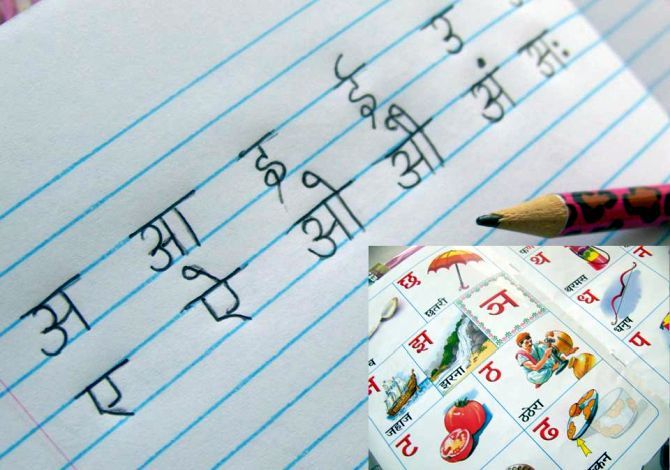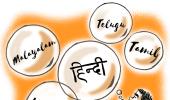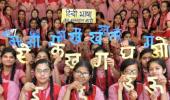Revising its draft education policy, the Centre on Monday dropped the contentious provision of compulsory teaching of Hindi in non-Hindi speaking states after the three-language proposal sparked outrage, mainly in Tamil Nadu.

The Dravida Munnetra Kazagham and other parties in Tamil Nadu, which had strongly opposed the proposal in the 484-page draft National Education Policy to make Hindi a mandatory third language to be taught in schools across the country, welcomed the Centre's decision.
The parties had alleged that the move was tantamount to thrusting the Hindi language on the non-Hindi speaking states.
"Students who wish to change one or more of the three languages they are studying may do so in Grade 6 or Grade 7, so long as they are able to still demonstrate proficiency in three languages (one language at the literature level) in their modular Board Examinations some time during secondary school," the revised draft of the NEP said.
In the earlier draft, the panel proposed mandatory teaching of Hindi in non-Hindi speaking states.
"Students who wish to change one of the three languages they are studying may do so in Grade 6, so long as the study of three languages by students in the Hindi-speaking states would continue to include Hindi and English and one of the modern Indian languages from other parts of India, while the study of languages by students in the non-Hindi-speaking states would include the regional language, Hindi and English," the earlier draft policy said.
Tamil Nadu had always resisted the "imposition" of Hindi. In 1965, the state witnessed violent protests against a proposal that Hindi would be India's only official language.
Karnataka Chief minister H D Kumaraswamy on Sunday said one language should not be imposed on others in the name of three-language formula.
The DMK on Monday said the Centre's decision showed that late party patriarch M Karunanidhi was "living," apparently suggesting that it was a success to his legacy of opposing "imposition" of Hindi.
After presiding over a meet of his party district secretaries, MPs, and MLAs, DMK president M K Stalin said in a tweet: "At a time when we are celebrating the birth anniversary of Thalaivar (leader) Kalaignar (late Karunanidhi), the Central government withdrawing the Hindi compulsory subject clause shows that Kalaignar is living."
"Let us guard mother Tamil always breaking up the hegemonic imposition of Hindi," he said.
The DMK on Monday celebrated the 95th birth anniversary of Karunanidhi, a former chief minister who passed away last August.
Hours before, the party meet said it would democratically fight tooth and nail any decision that may imperil the two-language formula in force in Tamil Nadu for five decades.
A resolution adopted in the meeting said: "This meet categorically states that the DMK will democratically fight tooth and nail any decision that may imperil the two language policy in force in Tamil Nadu."
It cautioned the Bharatiya Janata Party-led government at the Centre to "not play with the sentiments of the Tamil people."
Since 1968, after the DMK stormed to power in 1967 under the leadership of Dravidian stalwart and party founder C N Annadurai, a two-language formula of Tamil and English was being followed in the state.
The Pattali Makkal Katchi, an ally of the BJP, alleged that the recommendation was for imposition of Hindi and wanted the scrapping of the proposal.
Oscar-winning composer AR Rahman welcomed the Centre's decision. "Draft (NEP) policy corrected. Beautiful solution,'" he tweeted.
"It was a draft report and not a policy yet. We have sought feedback from various stakeholders. The committee has modified the earlier draft and made some changes," a human resource development ministry official said in Delhi..
According to the revised draft, the modular board examinations for language proficiency would test only basic proficiency in each language.
"Such a change in language choice in Grade 6 would certainly be feasible if the student so desires and would in such cases be supported by teachers and the schooling system."
Union minister Prakash Javadekar, who had the formed the panel when he was the HRD minister in the previous term, earlier asserted that no language should be imposed on anyone. He clarified that the committee had only prepared a draft report and no decision had been taken on implementing it.
Congress leader and former chief minister of Karnataka Siddaramaiah said no attempt should be made to impose Hindi forcefully.
"Nothing should be done against our opinion. There is no need for three languages. English and Kannada are there... they are enough. Kannada is our mother tongue, so primacy should be given to Kannada," he said.
He told reporters in Mysuru that there would be no compromise on the issues of Karnataka's water, land and language. Asserting that no attempt should be made to impose Hindi forcefully, Siddaramaiah said, "If they are making a three-language policy, then it will be like forceful imposition."
"Did we ask for Hindi? If it is done without our consent it will be forceful. It will be unilateral decision. We will also protest," he said.










 © 2025
© 2025